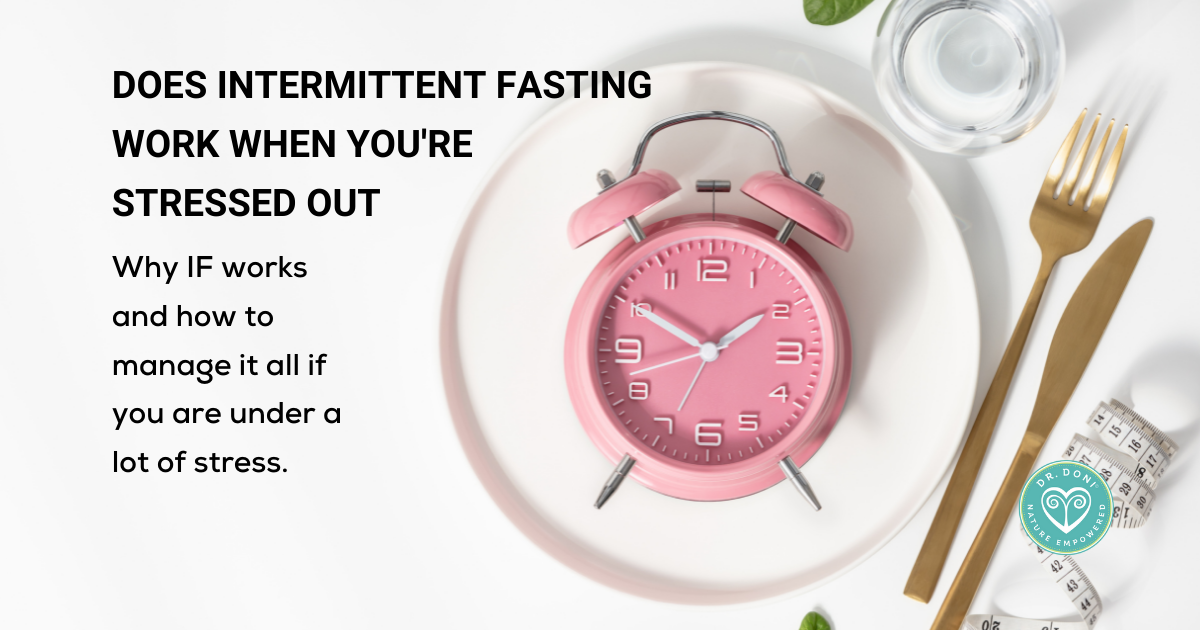
Does Intermittent Fasting Work When You’re Stressed Out?
- Home
- Stress & Adrenal Fatigue
- Does Intermittent Fasting Work When You’re Stressed Out?

Dr. Doni breaks down the science and process of successful intermittent fasting, including why intermittent fasting works and how to manage and modify its methods if you are under a lot of stress.
Your BFF recently lost 20 pounds through intermittent fasting, and now you think you’re ready to give it a try. The problem is that you have been under a lot of stress recently and you’re not sure if you can handle one more thing.
I believe in intermittent fasting. I know that it works and that it can be easily adopted into a healthy lifestyle plan, even if you are a little stressed out. Let’s begin by reviewing some science behind intermittent fasting, also known as “IF.”
What Is Intermittent Fasting?
It all starts with the food we eat. Carbs, particularly those addicting sugars and refined grains like white flour and rice, are broken down into glucose right away so that your cells can use it for energy.
When your cells don’t use all the glucose from the food you eat, some of is converted into glycogen and is transferred to your liver and muscles. The rest of the “glucose leftovers” not used by your body, are stored in your fat cells as fat.
The magic of fasting occurs when your body is no longer digesting and processing that last snack or meal. When this happens your “glycogen leftovers” are depleted (typically between 12-36 hours after your last meal). Hurray! This is when your body begin to break down more fat for fuel. Insulin, a hormone made in the pancreas, helps in getting glucose delivered into your cells.
The process of intermittent fasting is to take a break from eating, usually best done overnight when sleeping, which signals to your body to shift from burning glycogen to fat for energy. Source: Annual Review of Nutrition
Prolonged fasting will eventually prompt your body to experience ketosis, which is the metabolic switch that breaks down fat as fuel for energy. Source: Physiology, Fasting
So, intermittent fasting is simply choosing to extend the amount of time you are not eating overnight, which in effect decreases your eating window to a shorter period of time. Think of it as being intentional about the type of food you eat and the timing of when you eat.
Here’s how I like to break intermittent fasting down for my patients:
- You have a 24-hour day and you’re sleeping 8 hours, so you’ve already started a fast. That was easy!
- Now, stop eating a couple of hours before bedtime. Look at that – you are now fasting for 10 hours a day.
- Next, ease into waiting for 2 hours in the morning before you eat breakfast. And, just like that you are fasting for 12 hours a day!
How Intermittent Fasting Benefits Your Body
Weight loss is the primary reason most people start an intermittent fasting lifestyle, however, there are so many other benefits:
- Increased energy and mental clarity because insulin levels are lower
- Because your body isn’t working to process food for 24/7, you give your digestive track a rest
- Lower bio-physical markers: Insulin, blood pressure, cholesterol, and blood glucose
- Autophagy, which is your body’s way of getting rid of disease and disordered cells only happens when you are in a fasting state – ideally 16 hours of being in a fasting state
- Increased Human Growth Hormone (HGI) which build lean muscle and improves metabolic rate
The Connection Between Stress and Weight Gain
If you’ve tried everything to lose weight, including intermittent fasting, there’s likely a deeper issue at hand: It’s called stress and it’s rooted in the adrenal glands.
Here’s a caution: too much of a good thing isn’t good at all.
If you are fasting too long, you will cause a disruption to your hormones and digestion. Fasting too aggressively for your body (it is unique to each of us) increases cortisol levels because the body interprets starvation as stress.
When cortisol levels go up too high, for too long, it leads to high insulin and blood sugar levels, completely contradicting the benefits of fasting. High cortisol also turns off your digestion, so when you eat, you don’t digest as well, especially if you eat a larger meal, leading to bloating, gas, and food sensitivities. You may also experience emotional eating, ongoing cravings, and fatigue.
Getting the Balance Right
There’s more. Elevated levels of cortisol can cause high blood pressure, a weakened immune system, unhealthy changes in your sleep-wake cycle, low libido, and a sluggish metabolism. Low cortisol is also an issue, when it comes to IF, so either way, we need to help your adrenal glands heal so they can make just the right amount of cortisol.
You can see why knowing your cortisol levels is essential to your success in fasting, weight loss, and general health.
Cortisol levels are best tested at four different times of day using saliva or urine. There are affordable at-home test kits that also measure adrenaline and neurotransmitter levels. I offer these tests to patients and to program participants: SCHEDULE A BREAKTHROUGH SESSION HERE.
We need to understand how your body is uniquely affected by stress, and address it, before you adopt an intermittent fasting lifestyle. Otherwise, you run a risk of not benefitting or feeling worse.
Intermittent Fasting: Why It Can Go Wrong
The truth is that creating a metabolic reset in your body will take time. Your “messengers” – the hormones like insulin and cortisol, neurotransmitters, and even your digestion – are all sending signals to your body.
Changing those signals by fasting takes a little time for your body’s messengers to catch up, especially if you have been under stress and feeling burned out. To avoid stressing and disrupting your systems more while trying to IF, here is what to watch out for based on my Self C.A.R.E.™ approach:
- C = clean eating: Consuming too much food (too large of meals) after breaking your fast, or eating too many high-calorie, high-fat, and sugary foods during your eating window, will slow down your results. I like to break my fast with a protein shake.
- A = adequate sleep: Are you sleeping well each night? I do not recommend starting an intermittent fasting program if you are not sleeping for at least 7-8 hours a night.
- R = recovery activities: Stress recovery activities are needed to help your cortisol and adrenaline levels reset
- E = exercise: Be careful not to overexercise, which also increases cortisol levels
The Secret to Successful Intermittent Fasting
Start slow and stay steady. Instead focus on these goals:
- Improve your food choices
- Connect with your body
- Learn your body’s signals
By taking these steps and following my Self C.A.R.E. approach, you’ll begin recovering from stress and optimizing your cortisol and adrenaline levels. From there, it will be much easier and more effective to continue practicing intermittent fasting.
It is ALWAYS important to keep in mind that your body is unique. You do not want to follow a cookie cutter suggestion. I talk about this in-depth in my book: Master Your Stress – Reset Your Health.
There’s so much more that I want to share with you about serotonin, sleep, depression, GABA, dopamine, cortisol, adrenaline and yes, stress! available for pre-orders now (pub date: May 3, 2022).
In the book, you’ll learn to identify your stress type based on your cortisol level and how to re-balance and optimize based on Self C.A.R.E. and my Stress Recovery Protocol. You’ll also discover how to implement intermittent fasting safely and effectively, as well as many other anti-aging, bio-hacking approaches to longevity.
Here’s an easy link if you would like to share it: https://doctordoni.com/msrh
Thank you!
If you’d like more help with IF and recovering from burnout, reach out to my office (office@doctordoni.com) or simply schedule an appointment so I can guide you every step of the way.
—Dr. Doni
24th March 2022
IMPORTANT: INTERMITTENT FASTING CONTRA-INDICATIONS
Intermittent fasting is generally considered safe. Before embarking on an intermittent fasting lifestyle, consult a trusted medical professional.
Do not begin a fasting program if you have reactive hypoglycemia or if have diabetes. Children and adolescents should not participate in restricted time eating.
People who are pregnant or breastfeeding should not restrict their calorie intake for an extended period of time. Neither should people with disordered eating challenges, those with chronic liver or renal vascular disease.
Disclaimer: This specific article and all other Content, Products, and Services of this Website are NOT intended as, and must not be understood or construed as, medical care or advice, naturopathic medical care or advice, the practice of medicine, or the practice of counseling care, nor can it be understood or construed as providing any form of medical diagnosis, treatment, cure, or prevention of any disease.
Share this Post:
Dr. Doni Wilson
14 Day Detox Program
Take the Stress Type Quiz
Dr. Doni Social Media
Popular Posts


The 5 Burnout Types

Healing HPV Holistically: Dr. Doni on the Inspire Health by Jen Podcast

Recent Podcasts
Signup to receive our weekly newsletter with all the latest news, podcasts and special offers
New Book - Order Today!

SIMPLE PRACTICES for SHIFTING FROM YOUR STATE of STRESS to YOUR FLOW and FREEDOM
MASTER YOUR STRESS
RESET YOUR HEALTH
Order Now! Related Posts

What is making you susceptible to HPV?
I have been working with women who had abnormal cells on their cervix and/or vaginally, caused by HPV for over 20 years now. And while

The 5 Burnout Types
Did you know there are 5 burnout types? They are based on your Stress Type®, which is how your adrenal function has been affected by

Healing HPV Holistically: Dr. Doni on the Inspire Health by Jen Podcast
Dr. Doni was interviewed by Jen Ciszewski on the Inspire Health by Jen Podcast, talking about how to heal away HPV from your body for good.

Stress and Trauma: The Science Behind It, How It Shows Up and How to Heal: Dr. Doni on The Burn Fat and FEAST Podcast
Dr. Doni was interviewed by Sarah B. Thomas on the Burn Fat and FEAST Podcast, talking about the impact of stress and trauma on our health and what to do to recover from them.














